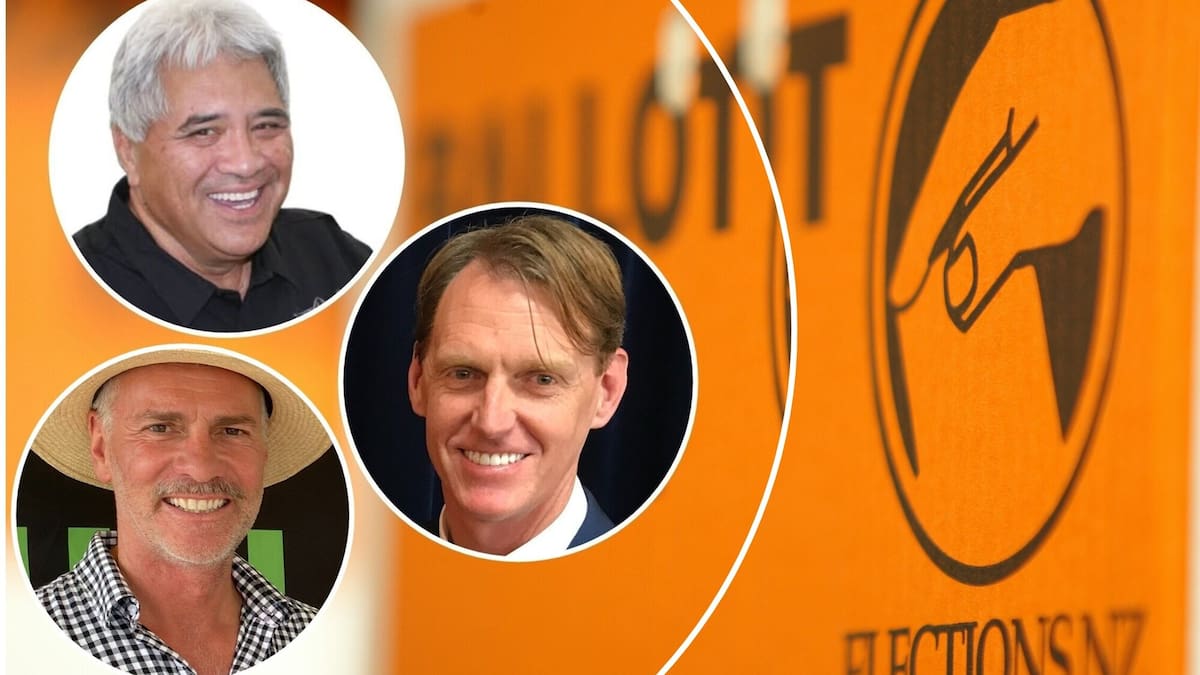Trailing well behind the leading trio was Ash Nayyar, with 1256 votes – 1783 behind Smith – effectively putting him out of the running.
The closeness of the race reflects a deeply competitive campaign and a divided electorate, which all mayoral candidates said they hoped to unify.
While it’s currently too close to call, Tane said he remained “quietly confident” of a win. If he misses out on the mayoralty, he’s still looking forward to contributing as a newly-elected first-term councillor for the Wairoa Ward, where he secured the top position with 2400 votes – nearly 1000 votes ahead of the second-ranked candidate, Joesephine Nathan.
The third spot in Wairoa is also hotly contested, with incumbent Gordon Lambeth leading Jan Beatty and former Māori ward councillor Ihapera Paniora by just four and 125 votes, respectively, on Sunday.
Kaipara’s other two wards were also close battles. Sunday’s results show Rachel Williams led Kaiwaka-Mangawhai, with 1968 votes, followed by outgoing Kaipara Mayor Craig Jepson (1693) and Luke Canton (1651) in the race for three vacancies.
Dargaville. Photo / NZME
In Ōtamatea, four candidates are battling for two seats, separated by 80 votes: Mike Schimanski (807 votes), Mark Vincent (737), Fiona Kemp (734), and Denise Rogers (727).
“It’s still anyone’s game,” Tane said.
He spent Saturday’s wait for progress results, manning the barbecue at his family’s farm, later returning home for “business as usual” – feeding animals and walking dogs – a good way to take his mind off the ongoing race, he said.
On Sunday, he had fielded calls from across the country and said he was pleased to tell people he had at least secured a seat at the table as an elected councillor, regardless of what might happen with the top role.
“The plan was to try to effect change at the leadership level and if not, try to contribute to change in a council role.”
While this will be his first term as a councillor, Tane said he feels well-prepared, having spent several years on various council committees.
His goal for the next three years is to help build a more transparent and cohesive council – one that listens to its constituents and avoids the block voting and behind-closed-doors decision-making he believes plagued the previous term.
“It’s about being an effective team and making good decisions,” he said.
Larsen was philosophical about the cliffhanger situation, saying all anyone could do was to wait for Friday’s final results.
He disputed Tane’s claims of block-voting on the current council. Councillors often reach the same conclusions on various issues. “That’s how democracy works!”
He also rejected Tane’s suggestion of decision-making behind closed doors, calling it “absolutely unfounded”.
“Kaipara District Council is one of the most open councils in the country,” Larsen said, noting several years ago he personally led a notice of motion that required the majority of council briefings to be held in public.
While some meetings must be held in private, due to commercial sensitivity, the onus is on transparency, he said.
If elected to the mayoralty, Larsen said his focus would be on ensuring stability and continuing the progress made in the current term.
Smith said it was too soon to comment on the mayoral race, but Kaipara could already celebrate its high voter turnout – Saturday’s progress count brought the total to 18,327 votes – 50.2% of those eligible – with strong participation across all wards: Wairoa (7306, 54.4%), Ōtamatea (4033, 48.8%) and Kaiwaka-Mangawhai (6988, 46.9%).
It was good to see, Smith said, that “the people of Kaipara had engaged in democracy and the chance to have their say”.
He had spent Saturday morning at markets in Mangawhai and Paparoa, encouraging plenty of last-minute voters.
Sarah Curtis is a news reporter for the Northern Advocate, focusing on a wide range of issues. She has nearly 20 years’ experience in journalism, most of which she spent court reporting in Gisborne and on the East Coast.

